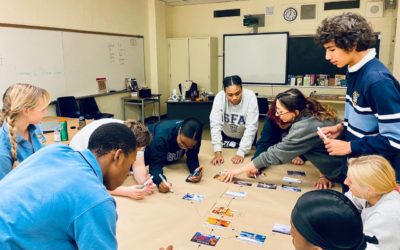National Day of Unplugging is an awareness campaign that promotes a 24-hour respite from technology annually observed the first weekend in March. It came out of the US where, for more than a decade, schools, religious institutions and businesses have used our resources to inspire healthy life/tech balance for their communities. Participation is open to anyone who wishes to elevate human connection over digital engagement.
Join us for National Day of Unplugging in Canada from sundown-to-sundown Friday March 5 to Saturday March 6, 2021.
Tech for Good Canada Ideas to unplug from digital media & connect with others :
You’ll find fun ideas below, as well as ways to support the cause of a safer and healthier Internet for young and old during this day of unplugging.
1. Connect for Phone-Free, Mixer-Free and Oven-Free Cooking or Baking !
Get a friend or family member to cook or bake with you March 5 or 6th. We’ve selected two recipes, one sweet, one salty, that are super easy to make, need no electricity (or phone), and also happen to be vegan, so no one is left out. Find all recipe visuals on Tech for Good Canada on Instagram soon.
Vegan chocolate mousse with avocado
En Français:
Voici les versions en français des recettes suggérees ci-dessus.
Rouleaux de Printemps ( végétarien)
You won’t believe avocado and cocoa could taste so good together!
Steps to unplug and connect with life:
- Print out one or both recipes ahead of time
- Get the necesary ingredients
- Prepare, on your own or, even better, with a friend or family member
- If you can’t prepare a recipe with someone in the same room, you CAN use a video call to connect with someone remotely,
- Share, with others, remotely or in the same room.
Yes, you can share pictures and videos of you eating your cooking with others, after the day of unplugging – in moderation. 😉 Tag @ TechforGoodCanada on Instagram , @TechforGoodCanada on Tik Tok and @TechforGoodCanada on Facebook, and @TechforGoodCan on Twitter.
The hashtag for the day is #DayofUnplugging
2. Write a Letter to a Senior in a Home or to a Family Member living Far Away
Take some time to write a letter (or draw a picture if you prefer that) about what runs through your mind as you unplug from social media and online games for a person living in a senior home.
If you prefer, write or send a drawing to an aunt, uncle, grand parent or maybe a brother or sister you haven’t seen in a while. Whatever your style, serious ou humourous, your thoughts will be appreciated.
Please send letters for seniors to us by March 8th so we can give them all to a senior home in Toronto. You can sign them or they can be anonymous or with a pseudonym. We’re at Tech for Good Canada, c/o CSI Annex, 720 Bathurst St, Toronto, ON, M5S 2R4, Canada.
If you’d like us to read your letter out loud in an upcoming Instagram live event, please let us know.
3. Do some Origami, in French, with Vivala Offline and Kozouf
Vivala Offline is a Canada-based company that offers fun ways to help us disconnect from screens and reconnect with each other and life. Its app is available for Android, with iOS on the way as of February 2021.
It has partnered with a great Montreal boutique called Kozouf that sells beautiful paper used for Origami. ‘ Origami ‘ is the art of Japanese paper folding. Céline, the owner, plays with patterns and foldings to add a touch of color and originality to the everyday life of all those who want it!
4. Write a letter to your representative about stopping online child abuse content everywhere
Help us support this cause with the Canadian Centre for Child Protection (C3P).
C3P representatives outline the many ways a regulatory vacuum and lack of a coordinated response in the digital space is harming, not only children, but also non-consenting adults.
C3P reported that through the operation of Cybertip.ca — Canada’s tipline for reporting online child sexual abuse and exploitation— several reports related to MindGeek-owned websites were actioned between 2015 and 2020. These included incidents involving child sexual abuse material (CSAM) on their platforms, as well as incidents of sexual exploitation or abuse.
Over that timeframe, 90 processed reports were forwarded directly to law enforcement and in 334 cases a notice was issued to an electronic service provider.
C3P Executive Director Lianna McDonald says platforms have insufficiently-resourced moderation practices, coupled with a deluge of unverified users generating content.
“While this committee’s focus to date has been largely been on the activities of MindGeek and their associated websites, it must be made clear that several mainstream companies operating websites, social media, email, and messaging services that most Canadians interact with daily could just as easily have been put under the microscope,” says McDonald. “We would never accept a standard where broadcasters or publishers were allowed to absolve themselves of responsibility for disseminating illegal child abuse images to the masses, and yet our collective inaction in the digital space has effectively done just that.”
C3P recommends the creation of a legal framework that would compel electronic service providers to adopt the following practices:
- Implement and use available tools to combat the flagrant and relentless re-uploading of illegal content;
- hire, train, and effectively supervise staff to carry out moderation and content removal tasks at scale;
- keep detailed records of user reports and responses that can be audited by authorities;
- be accountable, from a legal perspective, for moderation and removal decisions and the harm that flows to individuals when companies fail in this capacity; and
- build in, by design, features that prioritize the best interests and privacy rights of children.
More here on this appeal from the Canadian Center for Child Protection.







